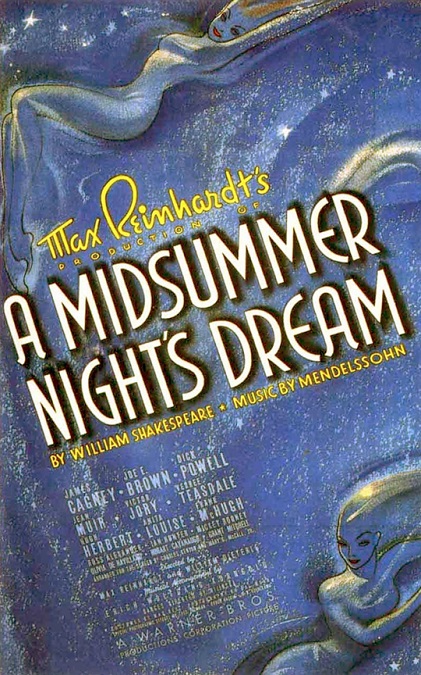
A Midsummer Night’s Dream – 1935
I loved this movie. I love Shakespeare’s playful story. I loved the brilliant costumes. I loved the fantastic sets. I loved Mendelssohn’s beautiful music. I loved the wonderful cast of actors. Well… with one exception, but we’ll get to that in a bit. The movie was very well done and I was thoroughly impressed.
We’ll begin with the plot. It is a Shakespearean comedy, so we know that it is going to have a happy ending with a couple, or in this case three couples, getting married. I’ll give a very brief outline of the plot, just to put the story in perspective. The main conflict of the plot is the fact that Hermia, a young girl of Athens played by Olivia DeHavilland, wants to marry her handsome lover Lysander, played by Dick Powel. Her father wants her to marry Demetrius, played by Ross Alexander. Both men love the same girl. But Helena, Hermia’s friend, played by Jane Muir, is in love with Demetrius.
So, Hermia and Lysander run away to the forest and plan to elope. However, the forest is full of fairies and sprites. The Queen of the fairies is Titania, played by Anita Louise. She is quarreling with her husband Oberon, played by Victor Jory. Oberon’s faithful servant, Puck, played by a young Mickey Rooney, fetches a flower for him which acts as a love potion to be used against his wife.
At the same time, a troupe of actors comes to the forest to rehearse a play. Puck gives the most pompous actor, played by James Cagney, the head of a donkey. When the love flower is used on Titania, she falls hopelessly in love with the donkey. The love flower is also used on the four young men and women with wonderfully comical results. It is a delightful story and one that has stood the test of time since it was first written around 1590.
The costumes were simply amazing. I would have loved to see this film in color! The use of gossamer fabrics, wind machines, sparkles, and as much glitter as you can imagine combined to make beautiful and fanciful costumes that were as creative as anything I have ever seen. And it was obvious that the costumes were made for dancing as they flowed and swirled and spun with the dancers, making them all seem ethereal and graceful.
And the movie was astonishing in its use of special effects. Yes! Believe it or not, this was actually a 1935 special effects extravaganza! There were constant shots of blended film images and overlays. The use of shadows and sparkling lights were combined to remarkable effect. Every shot seemed to have shimmer and shine that turned the fake movie sets into a magical fairy kingdom.
One memorable shot had an image of dancing fairies as they ascended a gigantic spiraling ramp. That image was overlaid with swirling fog to hide the ramp, and set around a gigantic tree. The result was that the fairies seemed to be dancing around the tall trunk of the tree, climbing on a swirling path made of misty fog. It was beautifully done and pretty impressive for 1935.
Notable actors of the cast were Anita Louise and Victor Jory. They were wonderful as the monarchs of the Fairy Kingdom. They were regal and majestic, and yet wild and dangerous all at the same time. I especially enjoyed Louise’s performance.
But I have to mention one actor that really got on my nerves. I’m sorry to say it, but Mickey Rooney was impossibly annoying! I’ll fully admit that this might have been the director’s fault for telling Rooney how he wanted the part played. But he delivered every one of his lines with such forced merriment and shouted laughter that I just wanted him to die. I much preferred the 1999 version of A Midsummer Night’s Dream with Stanley Tucci playing a much more reserved and yet lovable Puck. Rooney’s performance made the character seem ready for a strait–jacket and a room at the loony bin.
And lest I forget, the play within a play, Pyramus and Thisby, performed by Bottom’s inept troupe of actors was hilarious to watch. Sure, it was full of a more sight-gag based humor, but it was immensely fun, all the same. All in all, this was a delightful film and I really enjoyed watching it.
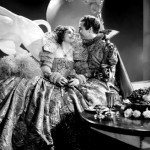
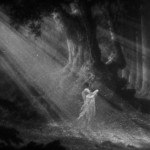
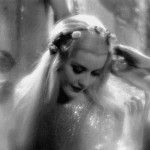
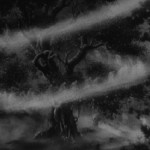
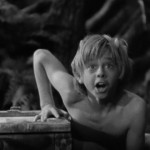
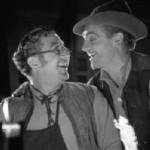
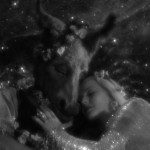
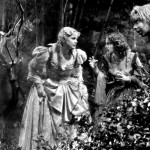
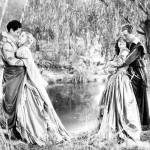
I was also thrilled with the costumes and production design. The shimmering effects were very effective and beautiful.
I think Mickey Rooney’s portrayal of Puck was adorable, as well as creative.
Impish to the max!
All in all a great film.
I wholly do not agree. I think the two most amazing characters are Mickey Rooney as Puck, and James Cagney. Amazing amazing amazing! Thank goodness they allowed Mickey Rooney to be the inspirational Puck??
I am just watching this movie on a large screen and went searching for a review. Yours has confirmed my opinion that this endeavor was (and still is) a fantastical wonderment for its time, as well as calmed my guilt in wanting to see the otherwise delightful actor, M. Rooney, hung from one of those sparkling trees until the movie concluded.
Thank you for a brief and comprehensive review.